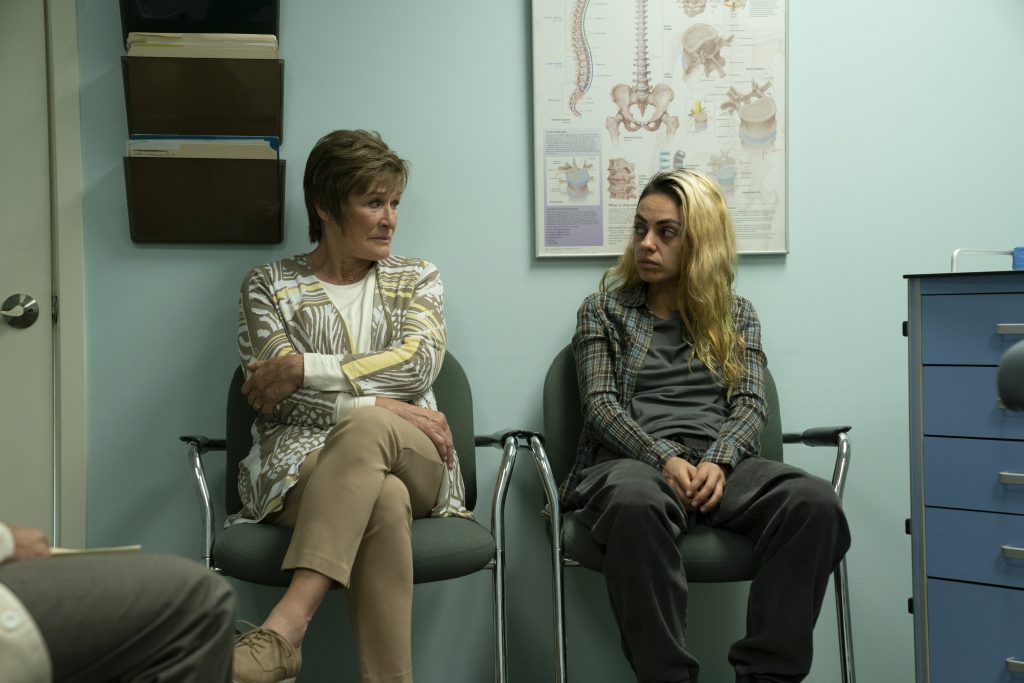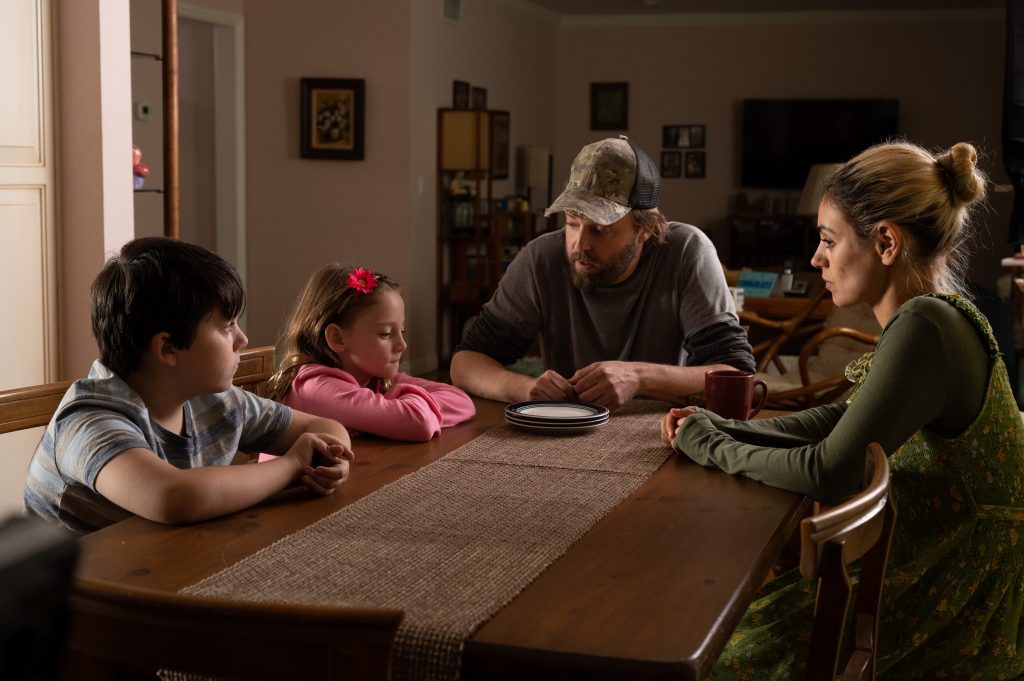January 1, 2022
by Carla Hay

Directed by Benjamin Cleary
Culture Representation: Taking place in an unnamed U.S. city, the sci-fi drama film “Swan Song” features a predominantly black cast of characters (with a some white people, Asians and one Native American) representing the working-class and middle-class.
Culture Clash: A graphic designer, who is dying from an unnamed illness, keeps it a secret from his family and secretly arranges for a clone to replace him.
Culture Audience: “Swan Song” will appeal primarily to people who are fans of star Mahershala Ali and will appeal to people who are interested in to seeing well-acted, emotionally heavy movies about how people might prepare for death.

The sci-fi drama “Swan Song” is a somber and slow-paced film that viewers have to be in the right frame of mind to see. It’s a very well-acted film that handles its subject matter with sensitivity, but it should be avoided if you’re not in the mood to see a movie about terminal illness and death. The second half of the movie is much better than the first half, which has some pacing issues and takes a little long to get to the heart of the story. “Swan Song” viewers also must have patience with movies that tell stories in a non-linear, non-chronological way.
Written and directed by Benjamin Cleary, “Swan Song” does a lot with the relatively small number of people in the cast. The movie is set in an unspecified year in the future, in an unnamed U.S. city. A graphic designer named Cameron has recently found out that he’s dying from an illness, which is also not named in the movie. The only clue to what this illness might be is that it causes deterioration of the brain.
Cameron is married to a loving and loyal wife named Poppy (played by Naomie Harris), a British immigrant who works as a school teacher for children with learning disabilities. Poppy uses music therapy for her students and composes and sings a lot of the music for this therapy. Cameron and Poppy have a bright and energetic son named Cory (played by Dax Rey), who is 8 years old.
Cameron is the more introverted spouse in the marriage, while Poppy is more of an extrovert. These personality differences are reflected in what Cameron and Poppy chose for their respective careers. When the movie does show Cameron do anything related to his graphic designer job, he’s by himself, with any outside communication done electronically.
Because a great deal of “Swan Song” is shown in flashbacks (including the movie’s opening scene), this is not a movie that people should watch while being distracted by other things. There are subtle clues that can be picked up when people watch this movie with their full attention. These nuances can lead to greater appreciation of “Swan Song,” which might bore some viewers who are expecting more action.
Cameron hasn’t told his family that he doesn’t have much longer to live. That’s because he’s secretly decided to sign up for a relatively new scientific experiment from a company called Arra, which lets terminally ill people agree to have replacement clones made of themselves. (In this story, a human clone is sometimes called a “regeneration.”) As part of the contract with Arra, the terminally ill people who agree to be replaced by clones have to keep this decision a secret from everyone they know except for Arra employees.
Cameron’s clone is temporarily named Jack (also played by Ali), who not only has a replica of Cameron’s DNA but he also has a full transfer of Cameron’s memories, including subconscious memories. The only physical difference between Cameron and his clone is that the clone is given a small mole on the inside of his hand, so that the Arra staffers can tell the difference between the real Cameron and his clone. Clones are able to mimic human emotions, based on the clone’s implanted memories.
There’s a transition period when the terminally ill person and the assigned clone get to know each other. After this transition period, the clone officially replaces the terminally ill person when the clone starts to live its replacement’s life, and the clone’s memory of being a clone is permanently erased. The terminally ill person than lives at Arra headquarters until death comes.
“Swan Song” goes back and forth between Cameron’s ambivalence over wanting a clone to take over his life and flashbacks to what Cameron’s life was like before he knew that he was dying. In order to prepare for the clone to take over his life, Cameron has to spend time at Arra’s headquarters, which are designed to look like an upscale retreat. Cameron tells Poppy that he’s away on business to explain his absence from home.
Dr. Jo Scott (played by Glenn Close) leads Arra’s cloning project, and she’s determined to make it a success. She has only two human subordinates working with her: a technician named Rafa (played by Lee Shorten) and a psychologist/head technician named Dalton (played by Adam Beach). As Dr. Scott explains to Cameron, the rest of the staffing duties are done by artificial intelligence technology that she says can do the work of abut 50 humans.
Dr. Scott also tells Cameron, when he asks, that he’s only the third human who’s going through Arra’s clone replacement process. She has no ethical qualms about human cloning. “It’ll be as common as heart transplants, in a few years,” Dr. Scott confidently predicts to Cameron. Dr. Scott also keeps a tight reign on Arra’s secret cloning. When Cameron says he wants to tell his family about it, she’s quick to remind him that he signed a contract and that he will “lose the opportunity” if he tells anyone that he arranged to have a replacement clone.
During his stay at Arra headquarters, Cameron meets another terminally ill person named Kate (played by Awkwafina), whose clone has been out in the world for about 42 days when Cameron and Kate first meet. Dr. Scott says that Cameron should also meet Kate’s clone, so that Cameron can see how it’s nearly impossible to tell a clone from a real human being. Cameron goes to Kate’s job (she’s a real estate agent), where he meets Kate’s clone and Kate’s daughter Sammy (played by Mikayla Lagman), who’s about 10 or 11 years old. Sammy has no idea that Kate has been replaced by a clone. The experience of meeting a clone in the real world somewhat unnerves Cameron, who starts to doubt if he made the right decision.
Kate also has mixed emotions about seeing how her family and other loved ones were easily fooled into believing the clone is the real Kate. On the one hand, Kate says that “my guilt faded pretty quick” after she saw how her family wouldn’t have to worry if they knew the truth about Kate being terminally ill. On the other hand, it’s unsettling and sad for Kate to see a clone take over her life while Kate is still alive. Cameron will also go through the same mixed feelings, which Ali conveys with as much skill as a great actor can have when depicting an introvert.
There are additional reasons for why Cameron wants to keep his cloning decision a secret from his loved ones. Poppy is two months pregnant with their second child. And a few years earlier, Poppy’s twin brother Andre (played by Nyasha Hatendi) died in a motorcycle accident. Poppy went into a deep depression, where she could barely leave the house “for a better part of a year,” as Cameron tells Kate.
Poppy is in therapy over her grief. By contrast, Cameron has never been in therapy. Cameron doesn’t want to add to Poppy’s grief by telling her that he’s dying. Cameron also doesn’t want their unborn child and Cory to grow up without a father. Cameron’s own family history is barely mentioned, except when he tells Dr. Scott that his parents divorced when he was 5 years old, and he was raised by his mother. It might explain any extra motivation that Cameron has to make sure that his children have a father in their lives.
Before Cameron found out that he was terminally ill, he and Poppy hit somewhat of a rough patch in their marriage, where they seemed to be drifting apart. In a private conversation between Poppy and Cameron, she tells him that’s she convinced that her unexpected pregnancy with their second child is a sign that the child will be good for their marriage. Cameron seems to agree, but his terminal illness diagnosis has permanently altered those plans, because it’s very likely that Cameron won’t live to see the birth of this child.
Flashbacks show how Cameron and Poppy met: They were both commuter train passengers sharing the same table. They both ordered the same chocolate bar, but when Poppy started eating the chocolate, Cameron mistakenly thought that she was eating his chocolate bar, but they ended up sharing it anyway. It became an endearing joke between them.
Other flashbacks show their courtship, marriage, parenthood, and how Andre was a close member of their family. (Ace LeVere portrays Cory at age 2. Aiden Adejuwon plays Cory at age 5.) One of these flashbacks is of a conversation between Cameron, Poppy and Andre, where Andre talks about the news that human cloning experiments were happening. Cameron seems turned-off by the idea and says that he wouldn’t want a human clone of himself. He obviously changed his mind after getting diagnosed with a terminal illness.
Ali and Harris, who co-starred in the Oscar-winning 2016 film “Moonlight,” have good chemistry together and make a believable couple. Some viewers might feel that not enough of Cameron and Poppy’s relationship is shown, since the vast majority of the relationship is presented in flashback snippets. Harris’ role as Poppy does feel a little underwritten, since she’s mostly depicted as a cheerful and upbeat wife. The depression she had over Andre’s death is not really shown, even though this depression no doubt caused some of strain in her marriage to Cameron.
“Swan Song” is also a little uneven in explaining Arra’s cloning procedures. There are some questionable decisions in the process that no self-respecting psychologist/psychiatrist would recommend. For example, terminally ill humans are allowed to see how their clones interact with loved ones as the humans’ replacements. The clones are equipped with contact lenses that are linked to live video monitors that can be watched at Arra headquarters by the scientists and the human who’s being replaced. If there are no problems in the trial run, the clone’s memory is then erased about being a clone, and the clone will then move on to living life as the human’s replacement.
“Swan Song” doesn’t do a very adequate job of explaining why these scientists would want terminally ill people to see clones completely replacing these humans without the humans’ loved ones knowing, when the psychological effects would be too risky. Some terminally ill people might feel comforted at seeing their replacement clones take over their lives. However, most terminally ill people would probably feel disturbed by seeing a clone living the life that the humans want to have.
After Jack the clone (before he officially becomes Cameron) is sent to live with Poppy and Cory for this trial run, Cameron sees how Jack is interacting with his family. Cameron reacts exactly how you would expect him to react. It leads to a certain confrontation that affects Cameron’s decisions for the rest of the story.
“Swan Song” (whose futuristic cinematography is awash in a lot of gray and blue) doesn’t hit its best stride until the last 20 minutes of the movie, when Cameron makes a pivotal decision that affects his journey. Ali has his most impactful “Swan Song” scenes in this last part of the movie. Cameron is not a naturally expressive person, so he keeps a lot of his emotions bottled inside until he can no longer ignore his feelings. “Swan Song” might be set in the future, but it effectively shows how issues about humanity and the fragility of life are timeless.
Apple TV+ released “Swan Song” in select U.S. cinemas and on Apple TV+ on December 17, 2021.











